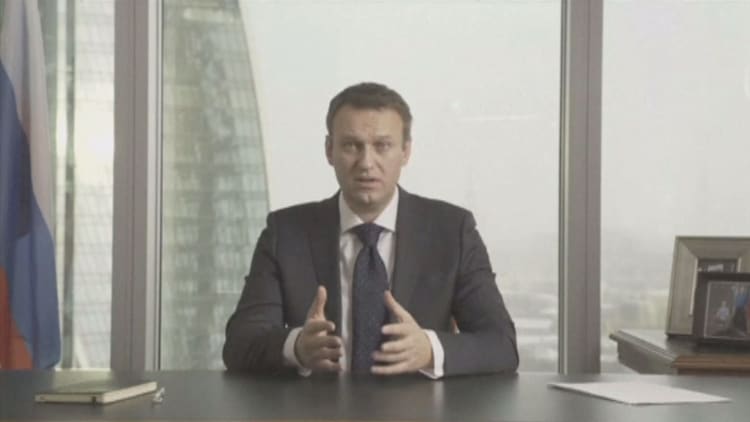
Hundreds of Russians, including President Vladimir Putin's main political opponent Alexei Navalny, were arrested Sunday after nationwide anti-corruption protests saw thousands take to the streets to demand the resignation of Prime Minister Dmitry Medvedev.
The demonstrations, thought to be the biggest show of defiance against the Kremlin since 2011-12, come a year before Navalny is expected to run against Putin in Russia's 2018 election. CNBC takes a look at what this means for the country's future.
Who is Alexei Navalny?
Leader of Russia's opposition Progress Party, Navalny is generally considered one of President Putin's harshest critics and has faced a series of arrests and short jail terms for his protesting against government corruption.
He is currently trying to unseat former-President Medvedev over allegations that he has amassed a collection of mansions, yachts and vineyards during his time in government.
While fairly popular in certain urban communities, Navalny's Westernized opposition party has struggled to field the levels of support enjoyed by Putin. However, its aims of channeling public discontent over government corruption garnered wider-reaching support on Sunday, including in more provincial communities such as Siberia's Chita and Barnaul.
What happened at the protests?
Navalny's anti-establishment calls prompted as many as 99 rallies across the country Sunday, however, all but 17 were declared illegal by authorities, resulting in hundreds of arrests.
Navalny was among those arrested and placed in a police truck as he walked with protestors near Moscow's Pushkin Square. 17 of Navalny's associates were also arrested in their office, according to the Associated Press.
Sunday's arrests, which range in estimates from 500 to over 1,000 people, have been condemned by international authorities, including the EU and the U.S., who have called for the release of detainees.
"We call on the Russian authorities to abide fully by the international commitments it has made, including in the Council of Europe … To uphold these rights and to release without delay the peaceful demonstrators that have been detained," the European Union said Monday.
However, Russia rejected these calls Monday, describing the demonstrations as illegal and accusing the organizers of paying teenagers to attend.
Kremlin spokesperson Dmitry Peskov called the protests a "provocation", speaking to reporters via a conference call, and said authorities were concerned that opposition activities would try to encourage further illegal activity.
What's next for Navalny as he faces trial?
Navalny appeared in court Monday where he faced charges of staging an unauthorized protest.
He was found guilty and sentenced to 15 days in jail, as well as being fined 20,000 rubles ($350), according to Reuters.
Navalny was already serving a five-year suspended sentence. Monday's trial further calls into question his chances of running against Putin in next year's election.
Navalny posted a selfie from the courtroom Monday morning ahead of the trial, saying: "There will come a time when we will judge them - and it will be fair."
What does this mean for the Kremlin?
The outcome of Navalny's trial is likely to give some indication of the Kremlin's on-going stance towards this wave of discontent.
Putin's government is sensitive to political demonstrations and corruption allegations and a series of recent corruption charges against Russian officials suggest that it is seeking to respond to popular criticism, suggests Tim Ash, emerging markets senior sovereign strategist at Bluebay Asset Management.
"It seems likely that we will see Medvedev shuffled out in the very near future – and likely well ahead of presidential elections due in March 2018," predicts Ash.
"It will be interesting whether Putin goes for a reformer such as Kudrin, or perhaps Nabuillina, to inject some new momentum into the regime – perhaps also providing some outreach to Russia's new found allies overseas, e.g. from within the (Donald) Trump White House."
This could also lead to further economic concessions as the incumbent government tries to make up for the perceived misspending of public funds, notes Andrius Tursa, CEE adviser at Teneo Intelligence.
However, equally possible is a push to rebuild nationalist sentiment by embarking on "foreign adventures", as was seen with the annexation of Crimea following the last wave of major protests, suggests Ash.
"Putin can go either way, or perhaps try both," Ash said.


